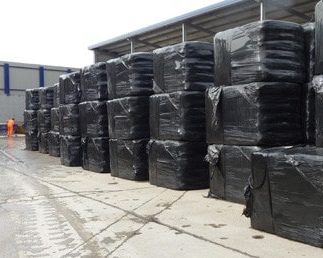The comments come after an industry meeting held by Defra last week (10 January) on the potential impact of a ‘no-deal’ scenario on waste exports.

RDF exporter Andusia, which was represented at the meeting, has claimed that there “appears to be no strategy in place to avoid interruption to the industry”. The company exports close to 180,000 tonnes of RDF from the UK to facilities on the continent.
Attendees of the meeting heard that in the event of ‘no-deal’ material could be diverted to landfill as a last resort, if it cannot move due to delays at ports.
Reassurance
Some in the sector have suggested that any disruption could be short-lived, and an element of reassurance was offered during the meeting over continuation of current arrangements around Transfrontier Shipment notifications.
The likelihood of the UK leaving the EU without a deal could become clearer this week, with MPs due to vote tomorrow (15 January) on the deal brought forward by Prime Minister Theresa May, following negotiations with the EU.
At last Thursday’s meeting, waste exporters and industry representatives heard presentations from Defra, the cross-government Borders Delivery Group and the Environment Agency. Discussions centred on concerns over export including TFS applications, customs checks and traffic congestion, if a no-deal goes ahead.
It followed concerns raised by the industry that delays at ports could potentially lead to issues with storage, stockpiling, and some material diverted to landfill (see letsrecycle.com story).
According to Andusia, the meeting highlighted the likelihood of possible delays at ports during the months following a no-deal Brexit.
Planning
Andusia director, Steve Burton, who attended the meeting, said: “It is a shame that government have left it until now to listen to the waste industry and plan for a no-deal scenario. There appears to be no strategy in place to avoid interruption to the industry.”
On TFS notifications, Jakob Rindegren, recycling policy advisor at the Environmental Services Association said he had been assured that the EU competent authorities will allow notifications to roll-over after Brexit, which he described as “good news”.
However, he explained that the concern is now with temporary disruptions at ports.
“Delays and extra costs are of course unwelcome but our members have put in place contingencies to minimise the impact. Another concern is the risk of increased waste crime and abandoned sites.”
Landfill
And, he explained, that as a last resort, material would be diverted to landfill. Mr Rindegren said: “As a final resort, if material cannot move for a certain amount of time due to delays at ports, material would unfortunately in some cases have no other option than to go to landfill. Our members will however work hard to try to avoid that to happen.”
“As a final resort, if material cannot move for a certain amount of time due to delays at ports, material would unfortunately in some cases have no other option than to go to landfill.”
Jacob Rindegren
ESA
It is understood that if RDF has to be sent to landfill in the short-term, exporting companies may have to foot the bill for disposal of this material.
Mr Rindegren added: “We have heard no suggestion from the government that landfill tax could be suspended.”
One exporter told letsrecycle.com that in the event that RDF is redirected to landfill the party liable for the cost of disposal would vary depending on contracts. However, he explained that most local authorities would have a “robust” agreement in place putting the responsibility on the exporting company to deal with disposal.
Another attendee of the meeting said he expected that logistical and handling costs of exporting waste could be affected by issues such as port delays, lack of drivers, shortage of back-haul capacity, and customs bureaucracy.











Subscribe for free